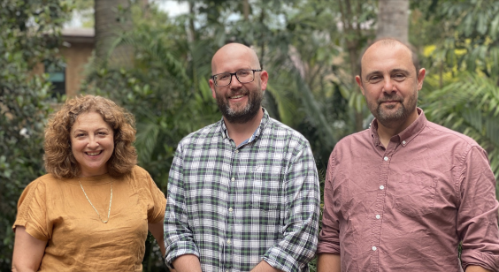March 1, 2021
Community Worker Resilience During COVID-19
The Community Resilience project was supported by Global Challenges in 2019 with the plan to produce a literature review on the adaptability and resilience of teachers and nurses. When COVID-19 hit, the team found themselves interviewing our frontline workers during the worst pandemic of our generation.
Dr Lynn Sheridan says her interdiscplinary team of researchers encountered emergency and disaster themes and literature back in 2019 as a side issue to their focus on day-to-day resilience and adaptability. Then when COVID-19 struck, they found themselves conducting interviews with frontline workers and their focus shifted almost immediately.
The team adapted their project to determine how frontline workers built support mechanisms for enhancing their resilience and ability, to be able to adapt to change during times of disaster and crisis. The team also had to change their methodology. They expanded their interview questions and changed how the interviews were conducted.
“We spent a bit of time trying to make the interviewees feel comfortable... Sometimes the interviews were longer than anticipated but we really tried to give them a sense that we wanted to hear about them personally, and we wanted them to share whatever they wanted to share about their experiences.”
The team didn't ask COVID-related questions, but COVID-themed answers inevitably just “came out”.
“The nurse interviews were absolutely amazing. It gives me goosebumps thinking of these interviews with young nurses who’d been in the profession less than five years, what they were experiencing in terms of COVID-19 and how they called upon their own personal resilience and their networks.”
Frontline workers reported the need to be responsive while being thrown in the deep end. Teachers mentioned the difficulty of having to shift to teaching online and getting rapidly up to speed with all the extra training required to respond to the pandemic. Nurses talked about dealing with cases coming into the wards.
“With COVID and because theatres stopped a few of their elective procedures, nurses were being sent to ICU. Some had no ICU experience at all... So these young nurses have had to be pretty resilient and adaptable to be able to learn help my patients."
Dr Sheridan said teachers relied on informal support through informal friendship networks but not necessarily through their formal workplace support mechanisms.
“Internal reporting was a bit more structured and formal for the nurses, and the lack of support became obvious. The nurses didn’t seem to be asked things like, ‘how did you feel about this’ or ‘when did you feel anxious about this’ or ‘when was this a problem for you?’ in relation to the pandemic.”
Both nurses and teachers talked about adaptability as a professional requirement, but thought that being resilient was a personal journey, something that you keep enhancing and growing from experience.
Dr Sheridan said one of the most worrying things was that many of the younger more recent graduates were reconsidering their profession.
“Sadly, a lot of them got to the point this year where they thought ‘I can’t do this job anymore, this isn’t the career for me.’”
Dr Sheridan says that one of the most striking things about the interviews with the nurses is a tough culture of sink or swim.
“My understanding of that attitude is that you don’t have much time as a nurse to worry about yourself, there are others you need to spend that energy on.”
The team is now looking at papers from Africa about HIV and Ebola outbreaks, and earthquakes and Dr Sheridan says it’s interesting what ideas they can take from those.
“They are completely different problems, but there are probably things that we can learn from and apply to the pandemic and other disasters,” she said.
Literature about past disasters indicates that people were quite tough, but two years later is when their resilience is at its lowest.
"The research tells us that after a crisis there is the potential for trauma to re-emerge a few years later for some people, in the form of post-traumatic stress.
"We need to know what organisations can do now and in the future to support frontline workers. At universities we can help to recognise the need for people to develop their networks, but organisations need to take this more seriously. It’s not just about paying for counselling but the kind of structural things can you put in place to make sure these frontline workers are supported and survive.”
Dr Sheridan says the team would like to do a collaborative national study to look at a larger groups of our frontline professionals in 2021, their resilience, adaptability, determine what different organisations are currently doing and what could they do better.
The team of investigators on the Community Resilience project include Lynn Sheridan and Peter Andersen, Roger Patulny and Jordan McKenzie, Grant Kinghorn, Rebekkah Middleton and Natasa Lazarevic.
